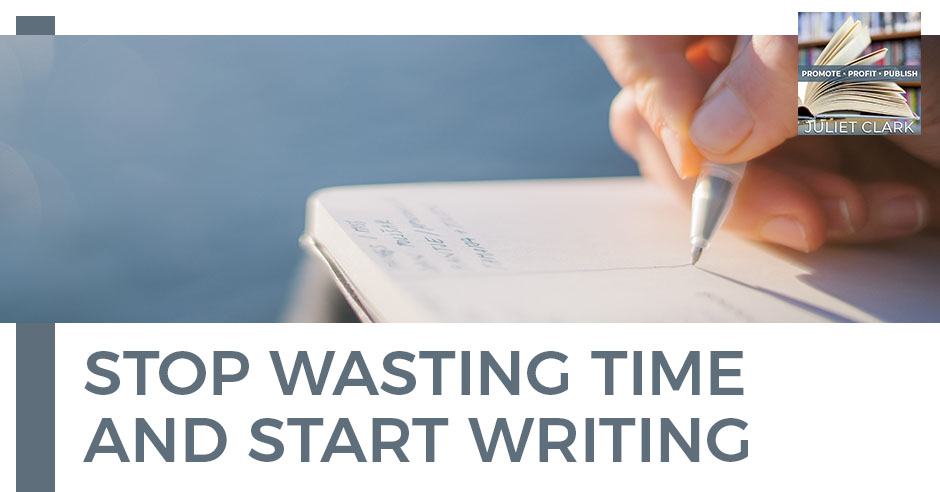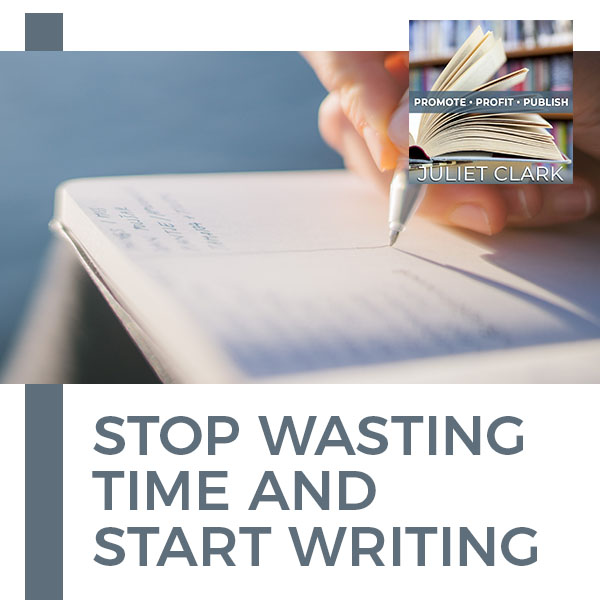
Have you ever had writer’s block, no motivation to write, or didn’t know how to start writing? That can be a huge problem and can also be crazy overwhelming from time to time, especially for writers. Today, award-winning children’s author and ghostwriter Kristy Johnson talks about how to stop wasting time and get that book started you’ve been planning to write all this time.
—
Watch the episode here
Listen to the podcast here
Stop Wasting Time And Start Writing
We are sharing with you one of the monthly calls that we have. This one is called Stop Wasting Time and Start Writing. I’m doing it in conjunction with Kristy Johnson, our Writing Development Coach, and also Sara Burke, who is our Content Development, both team members that work with us on our publishing projects. If you would like to show up to these live and be able to ask questions, we would love to have you go over and take the Author Ready Quiz. You can find it at www.AuthorReadyQuiz.com, and you will receive an invite to these monthly events. We don’t sell anything there. It’s just information. You have access to all three of us and are able to ask questions. I love this format that we’re doing, and I hope it’s helpful. Enjoy.
—
We’re going to talk with Kristy Johnson about how to stop wasting time and getting that book started, which I think is the biggest thing for people because they don’t know where and how to begin. That leads to all the mistakes that happened with the book that it’s disorganized. It’s not reader-centric, which is what a good book development coach will do to help you make the book reader-centric, instead of you blabbing out or barfing up your story. Kristy, take it. Tell us how we can get around all this.
The most important thing for people to know when they have this idea, they know it’s good, and it’s going to help them build their business, but it’s spitting in their heads, and they’re going, “I work too much. I have a family. I have all these things. How am I ever going to find time to write?” I’m going to get right to it. What that really is, is fear. The first level of fear that we all have to deal with when we’re writing a book is this fear that, “I don’t know how to do it,” especially if you’ve never done it before.
Even people who have written blogs or articles can sometimes get this terror at the idea of doing a book because the mind expands this book into this big, huge, monstrous, time-sucking thing that’s going to last for 2 or 3 years and, “It’s going to be this ordeal that’s going to suck the life out of me. It’s going to destroy my whole world,” but that’s just an illusion. Those are your blocks coming up and make you submit to their will.
I always find when I write a book, that it starts with working with that book development coach about the outline, getting streamlined about what you’re writing about. For those of you who don’t necessarily have the time to sit down, you do have the time to be in the car or be someplace where you can pull out your phone and start talking about your outline.
I have a client that I’m working with who works 12 hours a day and 6 days a week. In 2 months, she has written 19 chapters. She’s brilliant. She’s extremely busy, but I taught her my secret weapon, which is how you outline a book. This is the book that I’m going to write and how you do it. She took that and ran with it. Now, we’re nineteen. What happens when you work with a book development coach is number one, that person helps you focus that idea so that you’re not spinning around like, “I could do this. I could do that.” That makes you confused and brings up fear because it’s like being on the road. You get to this crossroads, and you have no idea where you are or which way to go.
If you had someone say, “Go that way because that way is going to get you to where you want to be,” you feel a lot safer and comfortable. There’s a lot of talking and discussion to focus the idea and make sure it’s reader-centric. The number one mistake new authors do is the story is about them instead of about the reader. I can understand that. That’s an understandable thing. Having someone go, “We need to develop this a little more. We need to change it from worrying about you to worrying about them and how is it going to help them transform something in their lives.” That’s manageable. The second mistake is it’s too much information in the book because when you’re writing a book and you’re an entrepreneur, you have this massive amount of knowledge about your area.

Writing A Book: A book development coach helps you focus that idea so that you’re not spinning around.
The temptation is to dump it all into the book. You end up with this giant tome, and it doesn’t serve the reader. The problem with that is if it doesn’t serve the reader, they will read a couple of pages. If they’re not getting something out of it, they’ll go on to the next book. It’s about focusing, managing your time, having a strategy and someone guide you along the way that keeps you feeling confident in your abilities and in knowing that you’re headed in the right direction. That is the most important thing. The second thing that happens, the reason people want to put everything they know in is that there’s a level of Imposter syndrome happening there.
It’s like, “I need to show my knowledge,” but you have to remember that when you get so detailed and get too much in there that 99% of the people that read your book will not be self-motivated enough to try what’s working and what’s in there. You have to be specific enough that they have action steps that they’ll be motivated to take. That will lead to other things. You have to remember that most of those people will read it. They’ll do the exercises maybe, but if they don’t see action steps that are succinct, they’re going to go away because then it becomes hard.
You’re back in the spin and in this overwhelming tidal wave of feeling like it’s going to take two years of your life away from you. Here’s a little mindblower for you. Most books can be done and ready to go to publishing within six months. That’s especially true if you’re working with a developmental editor. My biggest success story was when you called me on New Year’s Day and said, “I have a client who has to have a book published and ready to go by May. I need it here in my publishing house by March 1st.” In two months, we went from raw idea to finished manuscript. He did his part and I did my part. Together, we made it happen.
That was 2018. He’s one of those rare authors who continues to sell books consistently every month nowadays because he’s out. That was crazy, and everybody was like, “What do you mean that it needs to be here by March?”
The secret of that was he was a clear example of someone who had so much information and wanted to put it all in the book. I forced him to focus on this one part. His a-ha moment was that the reader couldn’t get all this information. They need this piece that gets them to the next level. That is the thing you have to realize when you do a book. You want your reader to have the transformation, but you can’t tidal wave them across the continent and expect them to write it.
That was a challenge for Eric because he is very detailed in what he does with his healing. He needs a little bit of a perfectionist as well. We love him.
If your book doesn’t serve the reader, they will read a couple pages, and if they're not getting something out of it, they'll go on to the next book. Share on XHe’s got massive amounts of information as well. For him, it was a challenge to focus on one thing for the reader. Once we got to that point, then the book just manifested. Spending years writing is the other thing that we’ve already mentioned. I understand that. When I was first starting out, I did that, and it was ridiculous. It was like obsessing over every little word, “Should this be green or emerald? Should I look on the thesaurus and see all the different words for green?” It’s ridiculous. It helps to have someone who can go, “Is that important? What’s the really important part of this here? Is it that word or is it a bigger idea?”
I talked to a fiction novelist once who said, “I’ve been writing this novel for five years.” I’m like, “Where are you at on it?” She said, “I’m still on chapter one. I’ve rewritten it so many times. What do you think I should do?” I was like, “Finish it.” Here’s what I’m going to say about finishing it. Don’t worry about that first draft. Just get it done. If you don’t get it done, you will never have a book, then come back, start refining. That’s where that development coach comes in as well is you got to get it out first, and then you can go back, start refining it down, and rewrites. You don’t just rewrite a book once. How many times? We get books all the time. I did rewrite it.
I edit it. Sometimes I have to send it back to them with a bunch of comments and say, “This is what I want you to do,” then send it back to me and I’ll edit it because it’s not ready for a final edit. I would like to say for fiction writers that the key for fiction is to set up the structure of the story before you try to write it, or you will spin off in every direction there could possibly be. That’s why she’s having so much trouble.
My son wrote a 225,000-word book, and it has been in editing.
We’re on section 3 or 4 now.
Unfortunately, mom doesn’t like fantasy. She’s absolutely no help in this process. It doesn’t do it for me. I’m a mystery girl. The critique isn’t even there.

Writing A Book: The reason people want to put everything they know in their book is that there’s a level of imposter syndrome happening there.
Since he’s been learning the structuring, that has helped him immensely with plotting out the story so that the reader’s going, “I want to find out what’s happening next,” because the worst thing that anybody wants is for them to go, “I’m not going to read this book,” and go onto the next book. The worst thing was after all the time, blood, sweat and tears you put into a book, you want people to read it. Book coaches typically will just send you comments back and help you, whether it’s fiction or nonfiction, structure it, put it in order, with the flow, focus and all that.
A developmental editor, but like me, I’m a hybrid because I also edit. I’m fortunate right now that I’m working with some highly literate people and there are very few typos. That’s nice to have. I will fix all those little things because the idea is to get it ready to publish. It is good to have fresh eyes. I have a friend who will do a final proof to make sure I didn’t miss anything because this is a real thing that authors have. Their brain starts filling in where there are gaps and they don’t realize that there’s something missing there. When I developed for months and I had read the manuscript 5 or 6 times, I started to get that same thing going. I always have a backup of a final proofread before publishing to make sure because the last thing you want is some big boom.
You’re lucky that you have employees that can do that for you. Kristy is one of those rare people who actually has a program where you can get this all outlined and then right-hand chapter one off to her. She will edit chapter 1 while you’re working on chapter 2. It’s a combination of the organization, the edit, and accountability, which is why Sam has done so well with her because the book is being edited as it’s going along. You said to Sam, “You’ve got too much. We have to stop.”
“No more chapters. I need that.” She’s doing interviews. I’m like, “Give me the interviews because we need to put them in.” The book is getting pretty hefty with nineteen chapters.
Anything else these guys should know?
The main thing I think is that if you have an idea for a book, you should write it. I’m a big believer that when you get an idea, you know and you can feel it, it’s your idea to write. Asking for help with that is not an embarrassment because writing is a very specific skill. I started writing when I was in my twenties, a brand new teacher teaching in the schools. It took me a while to learn enough to be able to try to tackle something this big. It took me years. I wish I’d had someone like me back then teach me how to do it because it would’ve been a lot faster.
If you have an idea for a book, you should write it. Share on XI love that thing with the idea. If you guys haven’t read Elizabeth Gilbert’s book, Big Magic, it is a fabulous book. The biggest takeaway was if the universe gives you an idea and you don’t act on that idea, they’re going to take it and give it to somebody else who will act on it. If you’ve ever been in that position where you see a book or a TV show, and you’re like, “I had that idea,” chances are the universe took it away because you didn’t act on it and this person did. The other thing I want to mention is we have the hybrid wing of publishing now.
We don’t allow people to bring a book into the hybrid sphere because these are books that can be in bookstores unless you’ve worked with a book developer because we want the best of the best if they’re going to be bookstore materials. We require not only that you work with any developmental that you’ve worked with a book developer. I know we also have Jared Rosen. We work with quite a few of his people as well.
Working with our media specialists to get you out there because when you are in a hybrid place with your books, we’re at the point where we are printing books for bookstores, and there is a lot of author risk involved with that. It’s very important that you not only have the best book possible, but you’re engaged with media specialists and people out there promoting that book in the right way so that people don’t return it because if it goes into an actual physical bookstore and it’s not purchased, then it does get returned.
It is very important that you work with someone like that if you’re planning on doing a hybrid launch and going for that bookstore part of it. If you’re somebody who’s been thinking about writing a book, or you need to start building that author platform, we have a content creation crash course that is in June 2022. In that course, each day is two hours. Day one is working with Kristy on getting that book developed, outline that idea and that outline going. Day two is two hours with me. In those two hours, we’re going to dig deep into who that book is for. Everybody looks at the demographics. They don’t look at websites and press, cross-promotion, or where that audience is at that they’re going to attract.
I’m going to scare you about why you need to do this. If you’re an entrepreneur and you have a business, you probably haven’t done that’s holding you back from getting more business, as well as more eyes on the book. If you want to make a big bestseller list, you need to be able to leverage about 200,000 people in a list. There’s an assumption of how many people will buy. You’ve got a lot of work to do if you want to get to USA Today or Wall Street Journal bestseller, and even more, if you want to get to a New York Times.
On day three is working with Sara Burke, who’s an international content expert. Everybody needs content. That is part of your platform that builds trust. You’ll be working with Sara on, “Which platform am I on? Am I on the right platform?” getting some social media in place, and understanding what that content looks like. The course is $7.97. It’s a bargain, guys. We’re probably not going to upsell you into anything else. Don’t come into it thinking, “These guys are going to sell me a big package. We just want to get everybody started and pretty much introduce to our staff.” The dates for this are June 15th, 16th and 17th of 2022. It’s two hours a day. It’s not a big chunk of your time, but if you’re thinking about it, or even if you need help with that content aspect, or “Where is my audience?” which is a big deal, think about signing up.

Writing A Book: Everybody needs content. That is part of your platform that builds trust.
You can go over to ContentCreationCrashCourse.net to grab your spot. We’re going to be working with you guys on a group basis, but on a one-on-one, helping you flesh some of this stuff out. We are only taking fifteen people at the most. I suspect we’re going to get to ten and probably figure out that’s about our limit. We have another course that is talking about content. Thanks for stopping by. Kristy, where can we find you if we want to know more about what you do?
I also have a retreat business for writers. We do writer’s retreats, which is StarSeedJourneyRetreats.com. We have a writers retreat coming up in September of 2023 in Sedona. It’s going to be fabulous. You can email me there at Kristy@StarSeedJourneyRetreats.com or you can find me on Facebook, Kristy Boyd Johnson, and send me a message.
If you want to reach out more about that course, it’s ContentCreationCrashCourse.net if you want to go sign up. If you want to know more, email me at Juliet@SuperBrandPublishing.com. I’ll give you some more details on that. Thanks, guys.
Important Links
- www.AuthorReadyquiz.com
- Big Magic
- ContentCreationCrashCourse.net
- StarSeedJourneyRetreats.com
- Kristy Boyd Johnson – Facebook
- Kristy@StarSeedJourneyRetreats.com
- Juliet@SuperBrandPublishing.com
- Sara Burke
About Kristy Boyd Johnson
 Kristy Boyd Johnson is an award-winner author who developed a serious interest in writing for kids and teens as a young teacher. Over the years, she has ghostwritten over 30 non-fiction books for entrepreneurs. She now consults as a developmental editor to help entrepreneurs turn their vast knowledge into transformational books that sell.
Kristy Boyd Johnson is an award-winner author who developed a serious interest in writing for kids and teens as a young teacher. Over the years, she has ghostwritten over 30 non-fiction books for entrepreneurs. She now consults as a developmental editor to help entrepreneurs turn their vast knowledge into transformational books that sell.
About Sara Burke
 International Content Expert Sara Burke is the Founder of HLCC, a content creation firm dedicated to boosting small businesses around the world. Sara has authored three books, and ghostwritten over 100 books, eBooks and workbooks. Sara recently launched The New American Dream, a podcast dedicated to helping business owners understand how our changing business ecosystem can support their success.
International Content Expert Sara Burke is the Founder of HLCC, a content creation firm dedicated to boosting small businesses around the world. Sara has authored three books, and ghostwritten over 100 books, eBooks and workbooks. Sara recently launched The New American Dream, a podcast dedicated to helping business owners understand how our changing business ecosystem can support their success.









Leave A Comment